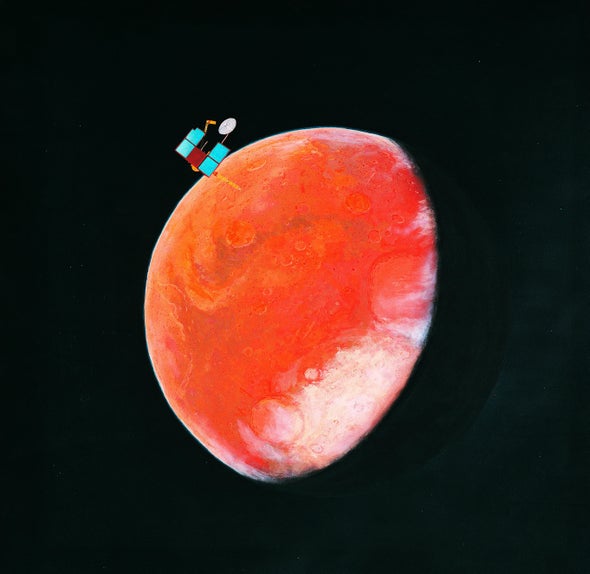(单词翻译:单击)
听力文本
This is Scientific American — 60-Second Science. I'm Christopher Intagliata.
(Armstrong: Houston, Tranquility Base here. The Eagle has landed. Mission Control: Roger, Tranquility. We copy you on the ground. You got a bunch of guys about to turn blue. We're breathing again. Thanks a lot.)
Fifty years ago this July, when Apollo 11 made its historic landing on the moon, Houston heard the news almost instantaneously, within a second or so. That won't be the case for human astronauts exploring Mars, where the one-way delay in communications could be anywhere from four to 24 minutes. Which will make it nearly impossible to carry on a normal conversation. The result is that Martian astronauts will need to operate with a degree of autonomy space travelers have never had.
Leslie DeChurch, a professor of communication and psychology at Northwestern University, has studied the psychology and collective intelligence of simulated astronaut teams here on Earth.
"Not only did they live in isolation and confinement in an analogue, but they spent approximately 30 percent of their time experiencing extreme communication delay. Meaning between 30 seconds and five minutes one way was the fastest they could have any communication go beyond just the other three crew members that were inside their habitat."

She spoke February 17th at a session called "Building a Winning Team for Missions to Mars," at a meeting of the American Association for the Advancement of Science in Washington, D.C.
"The nine teams we studied all showed improvement on what we would call behavioral dimensions of collective performance. That is their ability to time, coordinate, and sequence psychomotor activities improved."
"But let's talk about the bad news. As the teams remained in isolation and confinement for longer periods of time, their performance on what we call conceptual domains of performance, their ability to think together, to combine expertise, to solve problems creatively, declined with increasing time in isolation. Importantly, this is exactly what autonomy is going to necessitate of these future brave space explorer teams. They will be the ones who will have to autonomously carry out creative thinking, problem solving and decision making, with minimal assistance or at best remote assistance from teams back on Earth."
The hope is, by studying these simulations on Earth, we'll have a better idea which astronaut teams truly have "the right stuff" for a new era of space exploration.
Thanks for listening for Scientific American — 60-Second Science. I'm Christopher Intagliata.
参考译文
这里是科学美国人——60秒科学。我是克里斯托弗·因塔利亚塔。
(阿姆斯特朗:休斯敦,这里是静海基地。“鹰号”登月舱已经着陆。任务控制中心:收到,静海基地。我们记录了着陆状态。你让控制中心的几个小伙子紧张到缺氧。我们又能呼吸了。非常感谢。)
距今年7月50年前,当阿波罗11号历史性地登陆月球时,休斯敦任务控制中心几乎在大约一秒内就听到了这个消息。但人类宇航员探索火星的情况却不会如此,因为单向通讯可能会延迟4到24分钟。这使正常对话几乎不可能继续。结果是,火星宇航员将需要用此前宇航员所没有过的自主进行操作。
莱斯利·德丘奇是美国西北大学沟通与心理学的教授,她研究了地球上模拟宇航员团队的心理和集体智慧。
“在模拟环境中,他们不仅要隔离生活,还要在大约30%的时间体验极端沟通延迟。也就是说,除了与同舱内的另外三名宇航员交流外,30秒到5分钟的单向延迟沟通是他们能有的最快交流方式。”
2月17日,在华盛顿特区举办的美国科学促进会会议上,她在“为火星任务建立胜利团队”分会场发表了讲话。
“我们研究了9个团队,他们整体表现的行为维度都有所改进。也就是说,他们安排时间、协调以及排序精神运动的能力都有所改善。”
“现在我们来谈谈坏消息吧。由于团队在较长时间内处于隔离和限制状态,他们在执行概念域的表现,他们共同思考、合并专业知识、创造性解决问题的能力,会随着隔离时间的增加而降低。重要的是,这些正是未来勇敢的太空探索团队所需要的自主能力。他们将不得不在最少协助或至多在地球团队的远程帮助下,自主进行创新思考、解决问题和做出决策。”
希望通过研究地球上这些模拟状态,我们能更好地了解哪些宇航员团队拥有真正适合太空探索新时代的“正确资质”。
谢谢大家收听科学美国人——60秒科学。我是克里斯托弗·因塔利亚塔。
译文为可可英语翻译,未经授权请勿转载!
重点讲解
重点讲解:
1. or so …左右;…上下;
Though rates are heading down, they still offer real returns of 8% or so.
尽管利率在下降,它们仍然能提供 8%左右的实际收益率。
2. carry on 继续;接着;坚持;
The assistant carried on talking.
助理继续说下去。
3. carry out 实施;执行;实行;
She needed a clear head to carry out her instructions.
她需要一个头脑清醒的人来执行自己的指令。
4. at best 充其量;顶多;至多;
The rest of the acting is patchy at best.
剩下的表演顶多算是差强人意。


